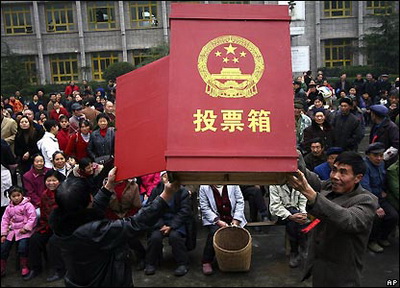Impressions of Democracy

On Tuesday, Kerry Brown from the Chatham House Asia Programme gave a talk on "village democracy in rural China" to the Foreign Correspondents Club of China at the Dutch Embassy. Dr. Brown has worked in Japan, Australia, Inner Mongolia, and China and has written extensively on political and economic development in China. His latest book is on elections in rural China. His talk promised to link the China’s burgeoning grassroots democracy to the fate of the nation as a whole, a monumental task that he bravely attempted to complete in a one and a half hour presentation.
Mr. Brown began his talk with a historical introduction to rural reform. He traced recent democratic reforms back to the Great Leap Forward and the Cultural Revolution, citing a "double layer of devastation" to rural China that paved the way for recent progress. Although, few would argue with the point that the famines of the 50s and 60s and Chairman Mao's reforms "destabilized" traditional rural life, or that rapid industrialization and urbanization continues to do so, still Mr. Brown never addressed why or how democratic reforms, such as those based on the 1988 Organic Law on Villager Committees, developed out of these particular historical conditions.
On actual elections, Mr. Brown's findings, like those of other political researchers, have been mixed. Election proceedings in rural China are still structured around a binary-system, pitting a communist party candidate against a so called "non-party" candidate. In certain areas, elections seem to have been relatively successful and have garnered interest and extensive local participation. In others, elections have been a meaningless activity that verified the appointment of party-approved candidates. But Mr. Brown claims to be "optimistic," since over 50% have been "successful," meaning the election was able to generate multiple candidates, implement secret ballots, and administer universal suffrage. He specifically cited Henan Province as a "battle ground" of election reform, where party members, grassroots campaigners and environmental activists wrestle for political advantage.
Throughout the talk, Dr. Brown pointed out discrepancies between foreign and Chinese perceptions of democracy. The word "democracy," he kept reminding us, which in the west has come to refer to a very specific multi-party electoral system, means something very different on the lips of Chinese officials. Perhaps because of my ignorance regarding the subject, this very difference seemed to raise more questions than the ones it attempts to brush aside. If Chinese "democracy" does not look like western democracy now, should it? If not, where should China look to for a legitimate model? Should we consistently use European and American standards of democracy as the yardstick of success?
Overall, Dr. Brown provided a glimpse into his research, but very little into the conclusions he has drawn from them. Despite progress, corruption runs rampant in rural areas, and migrant workers continue to flood into the cities. The conspicuous absence of an analytical unity to his talk seems to avoid addressing the question of whether a democratic process is really a vital asset to development in China. After all, democracy is not unconditionally desirable. Have elections actually resulted in improved accountability, financial transparency and a sense of community? These are all questions that Mr. Brown poses, either implicitly or explicitly, but never attempts to answer.
Dr. Brown did make a sweeping, if slightly troubling, comparison between China's economic development and current political reforms. He suggested that 1980s and 90s saw China open up to the world economically; it seems only natural for democratization to follow economic progress. But he soon admitted that the parallels were precariously drawn. China's economic reforms were implemented by powerful and tightly regulated state machinery. Democratic reforms at the highest level cannot and will not take place in the same way.
Finally, in a moment that would make academics around the world fall over in their chairs, Mr. Brown admitted, after the extensive research that no doubt went into the writing of his new book, that his "statistics" were more like "impressions."
At the end, we are left with the vague conclusion that the situation is "complicated" and "difficult." But the Chatham House expert hopes that ongoing debate about democratic reform will not reveal a "deep political split" in Chinese society.
Kerry Brown's book on grassroots elections, Ballot Box China, will be published in 2011.
Links and Sources
FCCC: Village Democracy and China's Coming Political Reforms
Chatham House: Dr Kerry Brown
BBC: Image of Ballot Box
The views posted here belong to the commentor, and are not representative of the Economic Observer |
Interactive
Multimedia

- EEO.COM.CN The Economic Observer Online
- Bldg 7A, Xinghua Dongli, Dongcheng District
- Beijing 100013
- Phone: +86 (10) 6420 9024
- Copyright The Economic Observer Online 2001-2011
















